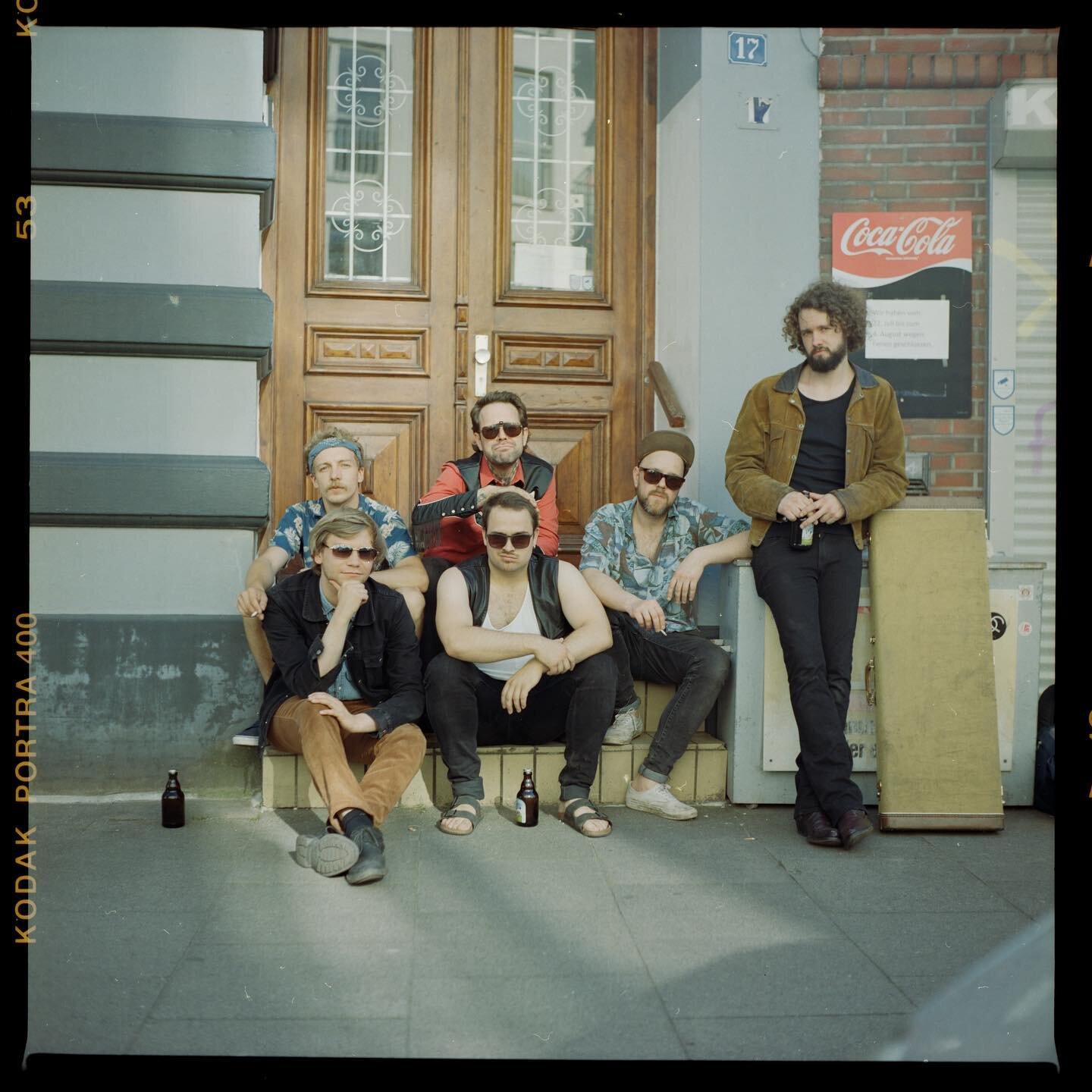Who are Swutscher?
Words by Sarah Morrison
Hamburg rockers Swutscher released their latest EP ’Senf,’ back in February. The band bring lo-fi rock / country / punk together to create a kooky and energized performance. Despite the normalization of singing in English, the band have kept their ground and write all their music in their native tongue of German. Their music has made quite the impression on the local music community and has even caught the notice of the American label and record shop Burger Records.
We spoke to lead vocalist Sascha Utech on the bands foundations, working with Burger Records, historical lyric inspirations, and their drinking band lifestyle.
Who was the first handful of musicians that you listened to as a child? Was music very prominent within your house?
I danced the Mussolini in diapers, my father played me many records, from DAF to Arkadiy Severnyy everything was there. I was really lucky that my parents were so knowledgeable about music.
You grew up in a home with a view of the city streets. What sort of people did you see? Did you ever make up stories about the people you saw walking by?
In Berlin, I often sat with my mother on the balcony, ate lunch, did homework, and enjoyed looking at the people passing by our balcony. That somehow got stuck and so I still like to look out of the window and watch funny people, like the self-proclaimed vigilantes in my old home country, who find their place in the song Drahtesel.
Is this why you prefer to be the narrator/observer when it comes to writing your lyrics?
I like to take the position of an observer when I write about politics at home and abroad but also when I see bizarre people at the butcher's counter.
You and your mum ended up moving out of a big city into a smaller rural community. Did that transition influence the way you approach writing?
The move influenced me in many ways, but not in terms of writing lyrics, because I was still too young. I wrote my first lyrics when I was about twelve years old when we were already in the next town. But there is a song (From A to B to C) where I thematize this time from Berlin to the countryside.
Is speaking about politics something important for you to do with your music?
Definitely!
It is a valuable asset to be able to write about this topic, in a free society and democracy, it is possible. Since I came early in contact with Blatnjak (crook chansons) and followed the stories of corrupt politicians in the GDR or the former Soviet Union with enthusiasm, it was somehow clear to me how special this freedom is.
What does the word ‘Swutscher’ mean?
My grandma gave us that name.
It comes from the Plattdeutsche and means as much as Liederlich lebender Mensch (vagabonds of the working class).
When did you meet the rest of the band? When did you all start writing music together?
In 2016, I met Martin, our drummer, and his Tiger 131 in the online game ‘World of Tanks.’ After a huge battle (which I lost), we started talking about common interests and politics, music, and Martin said that besides kicking the shit out of me in the game, he’s beating the drum set in his trailer in a small city near Hamburg. So we agreed to meet for a jam and that’s how the rock started rolling.
We started working on some of the songs I wrote and we had our very first gig as a two-piece in a Tattoo Studio of a friend of mine for fifty bucks and a tattoo of a dolphin on my belly button. After that Martin introduced me to Velvet, who was willing to record our first EP ‘Wahnwitz’ on a weekend in Martin’s trailer. During the recordings, Velvet started to write and record the second guitar parts for the songs and after we finished the EP, he was in the band. For the next show, Velvet brought Sven into the band to first join us on bass guitar and later on the lead guitar. Followed by Mike, who we had to kick out two times before he finally joined the band on bass.
Mike had the habit of not showing up to our shows, but how do you say: All good things come in threes. After that we met Seb at one of our shows, he actually helped us out with a keyboard stand, and we asked him to join the band on the keys.
Sascha, would you say that you lead when it comes to the start of writing a song?
Not really, I think we work together like good ol' Swiss clockwork!
There are a lot of musicians/bands that choose to sing in English over their mother tongue language. What made you decide to sing in German rather than English?
It just came naturally to me to sing in German as it is my mother language
When did you get involved with Burger Records?
We first met Burger Records when we played at their first edition of Burger Invasion in Hamburg. Then they released a Compilation of German Bands and artists where they included our song ‘Bodo.’
Is it true you recorded your debut album ‘Wilde Deutsche Prärie’ in a construction trailer in Schleswig-Holstein? What was the experience like?
Yes, indeed. We recorded the album within a week at Martins trailer in the summer of 2017.
We tried to record at a real studio, but it didn’t work out. It felt more natural to record in a familiar surrounding, as we used to rehearse in Martins trailer. And there was less distraction for us, so we could really focus on the songwriting and recordings.
You recently put out your new EP ‘Senf.’ The opening song ‘Monkey King’ is reminiscent of the expressionist doomsday motif at the beginning of the 20th century. What have you noticed about the present that could be compared to that time?
I see parallels to what is happening, for example, in eastern Germany - the electorate, that impulsiveness, even the youth. There are parallels, that is beyond question. I believe that almost as many countries are now ruled by monkey kings as they were then. Be it Johnson, Trump, or Bolsonaro in Brazil. It's not something you talk about. A simple, good advertising slogan like "Make America great again" is enough to get people for the moment.
Your song ‘On the Move’ is about a Tuck Shop highway romance. Was this inspired by any type of film or literature? Have you ever experienced this sort of romance before?
There is a TV series of the same name from the 70s/80s with the GDR actor/singer Manfred Krug who experiences the wildest adventures with his truck, very entertaining and recommendable. But the song was actually partly written on tour, I have seen so many rest stops in the last years that it was only a matter of time to write about it.
I am a huge rest stop fan and by the way, a very strict co-driver who looks at the speedometer and says: Not faster, concentrate, please!
How do you find a balance between music and working? You’ve mentioned you work with older people, what led you to that day job?
I have decided that work and music should be in good harmony for me. At six o'clock the alarm clock rings, but I find it very liberating not to have to turn over every penny three times. I like being caught in the cogwheel, also because I do something good with my work. We develop and sell GPS products for old people and people suffering from dementia. That's why it fills me out partly, but there is also a limit. For example, I could not work ten hours or more a day. There is a limit where my head switches off and says: Now you go to the sea or to the rehearsal room for an hour. If you find a healthy mediocrity, you don't have to take part in every shit as a musician.
What have you learned from one another since starting to tour? Can some of you handle the drinking lifestyle more than others?
Touring is hard work. It’s long days, with a lot of traveling, sitting around, nothing to do, and all this with up to nine (nine!) people in a van. Being on stage is just one hour of many hours a day. But this makes up for everything. When we started touring we were so hyped about it, we just drank every day at any time. Soon we had to realize that this is not a way to be. It makes the hard work even harder and will cost you your physical and mental health. None of us could really handle all the drinking and partying (even if we thought so). We never really had big personal issues in the band while touring, but it could get rough from time to time. As mentioned before, we’re nine people on tour.
Now we try to have a normal everyday life routine on tour, having breakfast together, getting some (band/music) work done while sitting in the tour van, having a nice conversation. Just regular stuff. We even try sports from time to time (hehe). After all the partying and drinking we now try to keep an eye on each other so none of us gets back home and falls into a bottomless pit like we used to.


